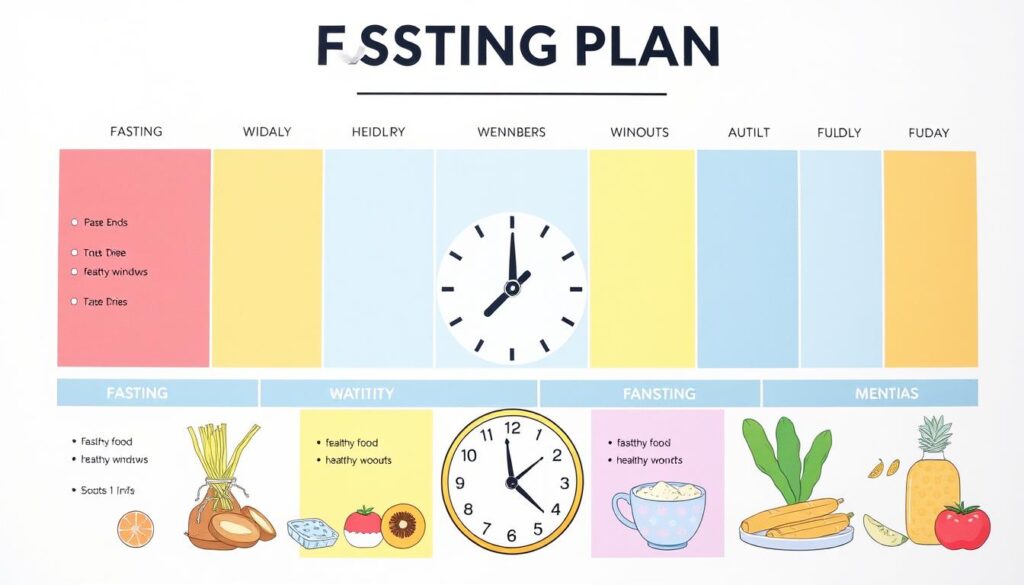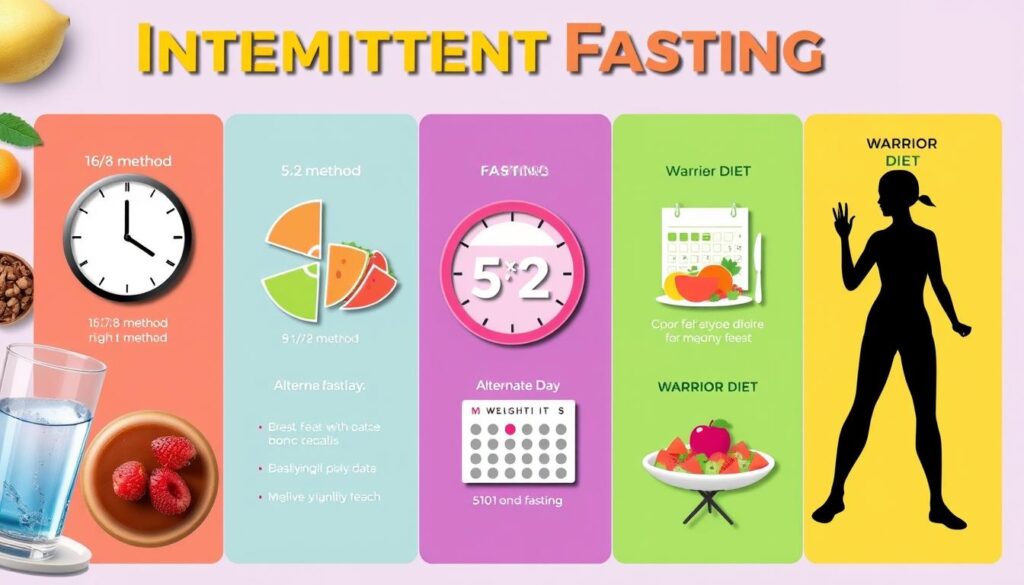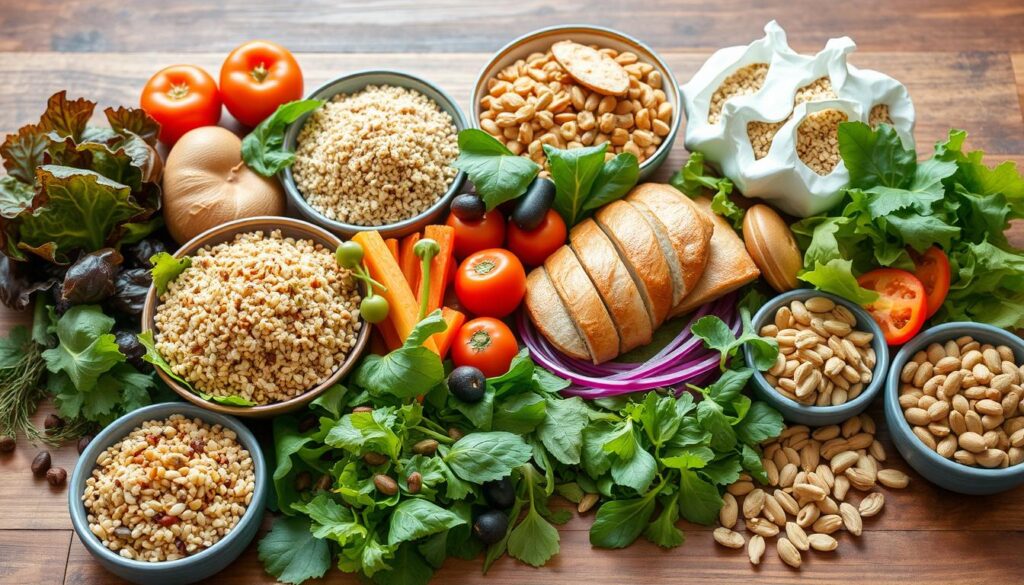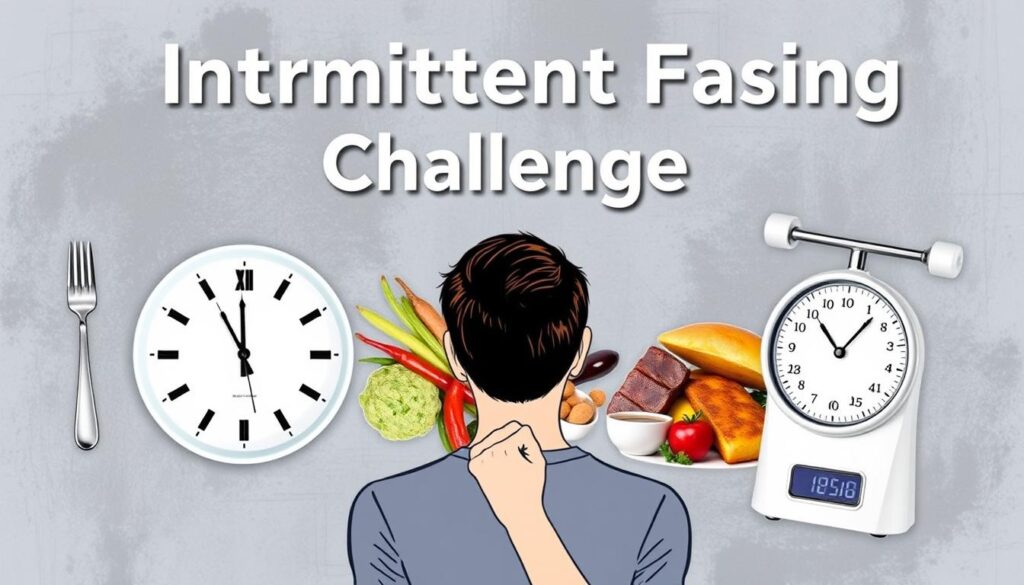Did you know that intermittent fasting can help with weight loss and improve your health? It’s safe and effective for many people. You can choose from different methods like the 16:8, 5:2 diet, and alternate-day fasting. This guide will help you understand the basics and get started with fasting.
Intermittent fasting means eating and fasting in cycles. It helps with weight loss, improves health, and boosts energy. Our guide will show you how to start with the 16:8 method or the 5:2 diet. You’ll get the tools and tips you need to begin.
Key Takeaways
- Intermittent fasting can help with weight loss and improve metabolic health
- There are various methods of intermittent fasting, including the 16:8 method and the 5:2 diet
- Intermittent fasting can increase longevity and reduce the risk of chronic diseases
- A fasting guide can help you get started with intermittent fasting and provide tips for success
- Intermittent fasting is not recommended for individuals with certain health conditions, such as advanced diabetes or a history of eating disorders
- It’s essential to consult with a healthcare professional before starting any new diet or fasting regimen
What is Intermittent Fasting?
Intermittent fasting is a way to eat that alternates between eating and fasting. It helps with weight loss, improves health, and can make you live longer. Our bodies work best when we fast, and eating too much can cause problems.
A fasting schedule can be made to fit your life. You can try alternate-day fasting, 5:2 fasting, or daily time-restricted eating. The goal is to find a pattern that fits your lifestyle, like eating only during certain hours or fasting some days.
Intermittent fasting has many benefits. It can lower inflammation, improve health, and help you lose weight. For example, studies show people lose 7-11 pounds in 10 weeks. It also helps control blood sugar in people with type 2 diabetes.

But, intermittent fasting isn’t for everyone. It’s not good for pregnant or breastfeeding women or people with certain health issues. Always talk to a doctor before starting this diet.
| Method | Description |
|---|---|
| Alternate-Day Fasting | Eat normally one day, restrict calories to 500-600 the next |
| 5:2 Fasting | Eat normally 5 days a week, restrict calories to 500-600 the other 2 days |
| Time-Restricted Eating | Restrict eating to an 8-12 hour window each day |
Benefits of Intermittent Fasting
Intermittent fasting offers many health benefits, like weight loss and better metabolic health. It helps you eat fewer calories, which can lead to weight loss. It also improves insulin sensitivity, lowering the risk of diseases like type 2 diabetes.
Some of the key benefits of intermittent fasting include:
- Weight loss: Studies have shown that intermittent fasting can lead to significant weight loss, with participants losing an average of 0.8-13% of their baseline body weight.
- Improved metabolic health: Intermittent fasting has been shown to improve insulin sensitivity, reducing inflammation and promoting autophagy.
- Increased longevity: Some studies have suggested that intermittent fasting may help to increase lifespan, with one study showing a 13% increase in lifespan in mice that fasted every other day.
Overall, intermittent fasting can be a powerful tool for improving overall health and wellbeing. By incorporating intermittent fasting into your lifestyle, you can experience the benefits of weight loss, improved metabolic health, and increased longevity.

| Benefit | Description |
|---|---|
| Weight Loss | Intermittent fasting can lead to significant weight loss, with participants losing an average of 0.8-13% of their baseline body weight. |
| Improved Metabolic Health | Intermittent fasting has been shown to improve insulin sensitivity, reducing inflammation and promoting autophagy. |
| Increased Longevity | Some studies have suggested that intermittent fasting may help to increase lifespan, with one study showing a 13% increase in lifespan in mice that fasted every other day. |
How to Get Started with Intermittent Fasting
Starting an intermittent fasting journey needs careful thought and planning. It’s important to pick a fasting plan that fits your life and likes. There are many options, like the 16:8 method, 5:2 diet, and alternate-day fasting. Choose one that you can follow and that matches your schedule.
A good fasting diet can help you lose weight and boost your health. When you add a workout routine, you’ll see big improvements in your body and mind. Set clear goals, like how many days a week you’ll fast, when you’ll eat, and what you’ll eat during those times.
Choosing the Right Fasting Method
It can take two to four weeks for your body to get used to fasting. Listen to your body and adjust as needed during this time. Some might prefer the 16:8 method, while others like alternate-day fasting. Success comes from finding a plan you can keep up with long-term.

Setting Realistic Goals
To succeed with intermittent fasting, set goals you can reach. Decide on your eating window, plan your meals, and drink plenty of water. Combining fasting with workouts can boost your fitness and help you reach your goals. Be patient and flexible, as finding the right balance takes time.
Common Intermittent Fasting Methods
There are many ways to do intermittent fasting, each with its own benefits and challenges. The 16/8 method is a favorite, with an 8-hour eating window and a 16-hour fast. It’s seen as a simple, lasting way to start fasting.
The 5:2 diet is another choice, where you eat only 500–600 calories on two days a week. Alternate-day fasting means fasting every other day, with some versions allowing 500 calories on fasting days. It’s important to pick a fasting schedule that suits you.

Finding a method that matches your lifestyle and likes is key. Some might find the 16/8 too strict, while others like the 5:2 diet’s flexibility. Alternate-day fasting is tough but can help with weight loss and health. Success in fasting comes from sticking to a method you can live with, and listening to your body to adjust your fasting schedule as needed.
Preparing for Your Fasting Journey
Starting your fasting journey means making some changes. You’ll need to control calories and eat a balanced diet. Also, staying hydrated is key, even when you’re not eating.
Think about the challenges you might face, like hunger or cravings. Having a plan can help you stay focused. This could mean setting achievable goals, slowly cutting out certain foods, and drinking plenty of water.

To do well with fasting, listen to your body and adjust as needed. You might need to change your fasting schedule or eat better during your eating times. Being flexible helps you overcome fasting hurdles and reach your health goals.
What to Eat During Eating Windows
When you’re fasting, it’s key to eat nutrient-dense foods during your eating times. These foods give you the energy and nutrients you need. A good diet includes fruits, veggies, whole grains, lean proteins, and healthy fats. Drinking lots of water and other calorie-free drinks is also important for health and energy.
Some examples of nutrient-dense foods include:
- Leafy greens like spinach and kale
- Berries, such as blueberries and strawberries
- Nuts and seeds, including almonds and chia seeds
- Fatty fish, like salmon and tuna
- Sweet potatoes and other whole grains
It’s also important to stay hydrated. Drinking water all day can help you feel less hungry and stay healthy. Eating foods that are full of water, like watermelon and cucumbers, can also help meet your hydration needs.

Eating nutrient-dense foods and staying hydrated can help you on your fasting journey. Listen to your body and adjust your diet if needed. This way, you’ll make sure you’re getting the nutrients you need.
| Food Group | Examples | Benefits |
|---|---|---|
| Fruits | Apples, bananas, berries | Rich in vitamins, minerals, and antioxidants |
| Vegetables | Leafy greens, broccoli, carrots | High in fiber, vitamins, and minerals |
| Protein | Lean meats, fish, eggs, legumes | Essential for muscle growth and repair |
| Whole Grains | Brown rice, quinoa, whole wheat bread | Rich in fiber, vitamins, and minerals |
Potential Challenges of Intermittent Fasting
Starting an intermittent fasting journey can be tough. You might face hunger and cravings and social situations challenges. Hunger and cravings are big hurdles, but they usually get better as you get used to fasting.
Dealing with social situations can be tricky, too. When food is involved, it’s key to plan ahead. You might eat before going out or choose wisely when you can’t fast. Knowing these challenges and having strategies can make fasting easier.

Some people might feel headaches, tiredness, or mood swings at first. Drinking plenty of water and listening to your body can help. Remember, fasting isn’t for everyone, like pregnant women or people with diabetes. Always talk to a doctor before starting.
| Common Side Effects of Fasting | Percentage of Participants |
|---|---|
| Headache | 61.3% |
| Lethargy | 68% |
| Mood Swings | 57.8% |
Tips for Success with Intermittent Fasting
Intermittent fasting can be very effective for losing weight and improving health. But, it needs dedication and the right strategy. To get the most out of it, keep track of what you eat, your fasting times, and your health. This helps you stay on track and motivated.
Being consistent is key to fasting success. Find a routine that fits you and stick to it, even on weekends. Having someone to support you can also help a lot. This could be a friend, family member, or an online group for fasting tips.
![]()
It’s important to track your progress. Watch your weight, measurements, and health markers. Also, listen to your body and adjust your fasting plan if needed. If you feel weak or dizzy, it might be time to make some changes.
Strategies for Staying on Track
- Set realistic goals and track progress
- Find a support system, such as a friend or online community
- Listen to your body and make adjustments as needed
By following these tips and staying committed, you can see great results from intermittent fasting. You’ll enjoy better health and more energy. Always keep track of your progress to make sure you’re getting the best from your fasting journey.
Intermittent Fasting and Exercise
When it comes to fasting and exercise, timing your workouts is key to reaching your fitness goals. Studies show that working out on an empty stomach can boost fat loss. Yet, others argue it doesn’t greatly affect weight loss. A 2014 study found that fasting before exercise led to more fat loss than eating first.
To maximize your workouts, it’s important to time your workouts right. This means exercising during your eating window or after fasting. Remember to stay hydrated, listen to your body, and avoid pushing too hard. Here are some tips for exercising safely while fasting:
- Timing a meal close to moderate- to high-intensity workouts to fuel performance
- Staying hydrated by drinking more water while fasting
- Replenishing electrolytes with low-calorie sources like coconut water to aid hydration
By following these tips and considering your needs, you can safely add exercise to your fasting routine. This way, you can reach your fitness goals effectively.
| Benefits of Fasting and Exercise | Outcomes |
|---|---|
| Weight Loss | Burn more fat |
| Improved Metabolic Health | Slow down metabolism if fasting long term |
| Increased Autophagy | Decreased performance during workouts |
Myths and Misconceptions About Fasting
Intermittent fasting is getting more popular, but many myths surround it. One big myth is that fasting is unhealthy or hard to stick to. But, scientific evidence shows fasting can be safe and boost health and life span.
Some people think fasting causes muscle loss or hurts athletic performance. But, scientific evidence proves fasting can help grow muscles and improve sports skills. It also offers health benefits like better insulin use, weight loss, and less inflammation.
A study of controlled trials found fasting doesn’t cause eating disorders in healthy adults. It can even help those with type 2 diabetes get better. Here are some important points about fasting myths and scientific evidence:
- Intermittent fasting can fit into different lifestyles and needs.
- Fasting boosts growth hormone production, which is good for muscles.
- Fasting improves how the body absorbs and uses nutrients.

In summary, it’s key to know the truth about intermittent fasting. By looking at the scientific evidence and understanding fasting’s health benefits, people can make smart choices for their health and well-being.
| Myth | Scientific Evidence |
|---|---|
| Fasting leads to muscle loss | Studies have shown that fasting can actually improve muscle growth and athletic performance |
| Fasting is unhealthy or unsustainable | Scientific evidence suggests that fasting can be a safe and effective way to improve overall health benefits and increase longevity |
Health Considerations Before Starting
Before starting intermittent fasting, it’s key to think about your health. Talking to a healthcare professional is a must, more so if you have health issues. They can guide you on the best fasting plan for your health.
Some groups should not fast at all. This includes pregnant women, kids, and those with eating disorders. Also, people with diabetes, kidney disease, or heart issues should be careful. They should talk to their doctor before fasting.
Who Should Avoid Fasting
- Pregnant or breastfeeding women
- Children and teenagers
- People with a history of eating disorders
- Individuals with certain medical conditions, such as diabetes or heart disease
Think about your age, weight, and health before fasting. By considering these factors and talking to a doctor, you can avoid risks. This way, you can enjoy the benefits of fasting.
Frequently Asked Questions About Intermittent Fasting
Starting intermittent fasting can raise many questions. Let’s tackle some common ones. People often worry about its safety and if it’s sustainable. But, if you listen to your body and follow the rules, it can be safe and beneficial for your health.
Some are concerned about losing muscle or affecting athletic performance. But, studies show that eating enough protein and nutrients during your eating times helps keep your strength and fitness.
For those new to it, start slow and let your body adjust. Notice any hunger or cravings and have a plan to handle them. As you get more comfortable, you can increase the length and frequency of your fasts. Remember, everyone is different, so find the method that fits your lifestyle and preferences.



















